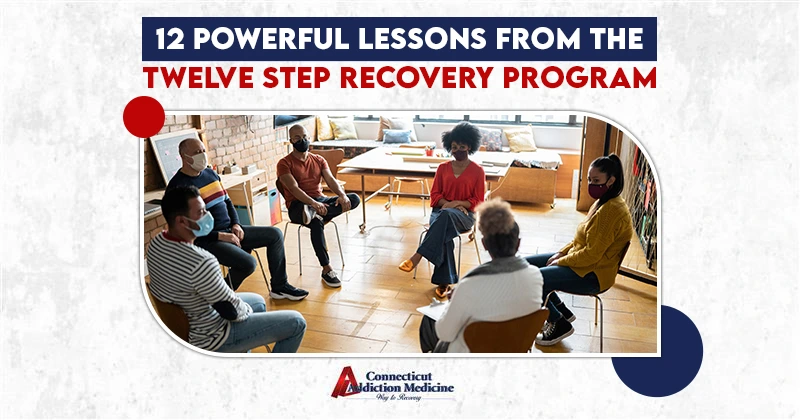The twelve step recovery program is one of the most recommended ways of overcoming addiction. For many individuals, it serves not only as a vehicle to sobriety, but also to restore their lives with structure. When individuals find themselves lost and feeling powerless against their addictions, these twelve steps can guide them through recovery.
The program is rooted in acknowledging that you need help, accepting your personal battles, making amends, and being committed to long-term recovery.
Over time it has expanded from alcohol addiction into narcotics recovery, behavioral addictions, and even support groups for families. The true power of the twelve step program lies in the community it fosters, and its encouragement of personal responsibility.
At CT Addiction Medicine, we believe no one should walk the road of recovery alone. We provide patients with professional medical care, counseling, and ongoing support to make their recovery journey easier and more sustainable.
Understanding the Twelve Step Recovery Program
The twelve step recovery program emerged in the 1930s through Alcoholics Anonymous.
The Twelve Steps are basic guidelines that assist individuals in stopping harmful behaviors and creating a better life.
For decades, there have been many adaptations across the globe. and aspects of the program may differ. The main motives are the same: hope, accountability, and development as an individual.
12 Powerful Lessons from the Twelve Step Recovery Program
The steps are more than rules; they are lessons in humility, courage, and healing.
1. Acceptance is the First Step
Recovery begins with acknowledging that addiction has taken control. Denial is replaced with acceptance.
2. Believing in Something Greater
The program emphasizes faith—not necessarily religious, but faith in something greater than oneself.
3. Letting Go of Control
One key lesson is surrender. Instead of fighting alone, individuals accept help and guidance.
4. Taking a Moral Inventory
A self-assessment of actions, mistakes, and habits is essential. It’s about being brutally honest with oneself.
5. Owning Mistakes
Confessing wrongdoings helps release guilt and shame.
6. Readiness to Change
Acknowledging flaws is not enough—there must be willingness to change.
7. Seeking Help for Inner Change
The lesson here is humility. People learn they cannot change everything on their own.
8. Making Amends
Where possible, relationships broken by addiction should be repaired.
9. Living with Responsibility
It’s about-facing consequences and making things right.
10. Daily Self-Reflection
The program encourages people to continue evaluating themselves each day.
11. Mindfulness and Spiritual Growth
Through prayer or meditation, individuals find strength and peace.
12. Helping Others
Recovery is not just personal. By supporting others, people reinforce their own healing.
Alcoholics Anonymous Twelve Steps
The alcoholics anonymous twelve steps remain the foundation of recovery. They stress honesty, humility, and accountability. Millions worldwide credit AA with saving their lives.
Narcotics Anonymous Recovery Steps
The narcotics anonymous recovery steps mirror AA but focus specifically on drug addiction. They offer a supportive community for those battling narcotics dependency.
Spiritual Principles in Twelve Steps
Each step has underlying principles such as honesty, faith, willingness, humility, and service. These spiritual principles in twelve steps help guide recovery and personal growth.
History of Twelve Step Recovery
The history of twelve step recovery traces back to the 1930s with Bill Wilson and Dr. Bob Smith. From a small group in Ohio, it spread globally and became the foundation for countless recovery movements.
Benefits
The benefits of twelve step program are many: structure, support, accountability, and community. It provides a proven pathway that has helped millions.
- Builds accountability
- Encourages honesty
- Creates a supportive community
- Promotes spiritual growth
- Offers free and accessible recovery help
How Do Twelve Step Programs Work
Understanding how do twelve step programs work helps reduce fear. They combine shared experiences, mentorship, and daily practices to build long-term recovery.
Criticisms of Twelve Step Programs
Some raise concerns about the criticisms of twelve step programs. These include reliance on spirituality, lack of customization, and variable success rates. Still, many find immense value in the approach.
Final Words
The twelve steps recovery program have helped countless numbers of people find the recovery they need to survive addiction. This program does not solely rest in the stepping stones but in the real sense of connection and accountability. The life lessons of acceptance, honesty, making amends, and giving service can change lives.
Searching for twelve step meetings near me is often the first action people take. Meetings provide connection, mentorship, and encouragement in recovery.
Some individuals may find twelve step alternatives and therapy to be more their style, it is analytically hard to ignore the foundation of the original twelve step model. From the alcoholics anonymous twelve steps to the narcotics anonymous recovery steps, the twelve step recovery program continues to save lives and create opportunities.
At CT Addiction Medicine, we are dedicated to helping patients create hope for healthier futures. Recovery begins when one person says, “I want to get better” and with the right institutional help, they will get better.
FAQs
Q.What are the twelve steps?
The twelve steps are guiding principles that support recovery, responsibility, and development.
Q.Do twelve step programs help?
Yes, many people do well in these programs, but it somewhat depends on the person’s commitment to the process
Q.Are there alternatives to the twelve step recovery?
Yes, there are twelve step alternatives available like SMART Recovery, cognitive behavior therapy, and medically assisted program options.
Q.What is the difference between the alcoholics anonymous twelve steps and narcotics anonymous recovery steps?
They follow the same principles, but the alcohol focus is on alcohol and narcotics anonymous is focused on narcotics as the drug of choice.

